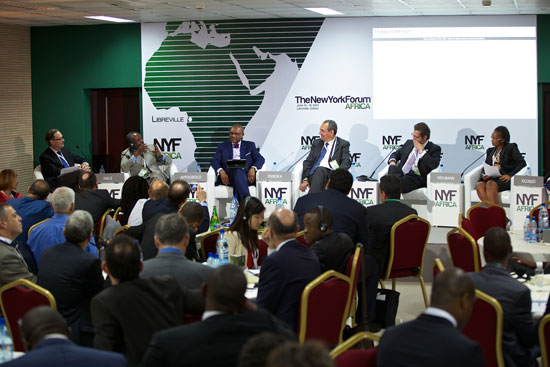Finance: Private Equity & Financing Growth

SUMMARY PAPER
by Uzoma Nwagba, Harvard Business School
Ruoshan Tao, School of Oriental and African Studies, University of London
TASKFORCE 3
FINANCE: Private Equity and financing growth
Are capital markets growing in depth as African companies and projects grow in increasingly
sophisticated economies?
Where are the best practices in financing?
Are local institutions providing the necessary financing?
Has the growth of African-‐oriented private equity changed the landscape?
- How can African suppliers partner with overseas counterparts to deliver quicker, faster, cheaper communications?
- Are satellite providers on the verge of a game-changing drop in price?
Speakers:
IDELPHONSE AFFOGBOLO, Founder & Chairman, Africa Capital, Ivory Coast
EBENEZER ESSOKA, CEO, South Africa, Standard Chartered Bank
KARIM HAJJI, CEO, Casablanca Stock Exchange, Morocco
STEFAN HEILMANN, Managing Director, IEG-‐Investment Banking Group, Germany
STELLA KILONZO, Founder, Astute Capital, Kenya
FATINE LAYT, Chairwoman and Managing Partner, Oddo Corporate Finance, France
Moderator:
DAVID HALE, Founding Chairman, David Hale Global Economics, United States
Discussion Summary
The panelists did a thorough job of analyzing and debating on Africa’s Private Equity market along three broad themes: Capital Markets, Investment and Exit Challenges, and the key External Factors that impact the industry.
Capital Markets
The moderator Mr. Hale probed for opinions on the sources of capital for private equity investment. Panelists generally applauded the growing activity in African stock and bond markets, but were of varying opinions on how much still needs to be done to meet the liquidity needs of African capital markets.
Mr. Essoka stressed a major challenge of too few individual investors funding Africa private equity. Institutional investors carry the majority of investments, leading to still not enough capital and tougher constraints raising them. Another challenge, championed by Ms. Kilonzo, was that most of the capital was coming from abroad and not much internal capital was funding PE investment. She however expressed a silver lining to the liquidity challenge, saying that it has encouraged African firms to innovate in their financing—for example, the increased development of Real Estate Investment Trusts for applicable projects in Kenya. We also see more African companies listed on foreign stock exchanges and multinationals listing their Africa divisions in the local stock exchanges.
Investment and Exit Challenges
Panelists agreed that private equity has played a key role in revamping operations and governance of African companies, developing many to the point where they could be listed on stock exchanges. Panelists however highlighted the challenges of too-‐long investment horizons and the difficulty in finding exits. Africa’s private equity investments usually have a 5-‐7 year horizon, as compared to a 4.5 year average in other frontier markets. The challenge here is partly due to structural market and regulatory challenges, but mostly a result of illiquid markets that would support exits through more diversified vehicles like IPOs.
Mr. Heilmann was a big proponent of investment in large technology ventures even from an incubation stage, as the most critical and broadly applicable sector that would push Africa’s growth especially amongst the young population. In his thesis, he stressed the need to have an ecosystem of entrepreneurs developing the skillsets and starting the ventures critical to make these investments viable.
External Factors Affecting The Industry
The last broad theme discussed was around macro factors and policy enablers that are critical for Africa private equity to continue to finance growth and even increase its capacity to do so. There was a heated debate on integration of capital markets across Africa as a critical step to increasing the liquidity of capital and enabling companies to list on bigger regional stock exchanges more liquid that then ones they currently list on, which are geographically constrained at least in perception.
Mr. Hajji cited that there are 54 countries in Africa and 22 stock exchanges, with a total market capitalization equivalent to that of Spain, a country with only one stock exchange. The majority of the panelists opined that African needs to have a more consolidated stock exchange or commensurate capital flows. The onus was placed broadly on the government to drive this effort to better facilitate private investment in Africa. Panelists agree that market structures are inefficient and a drain on resources, calling for African leaders to take control and come up with effective solutions as forums such as this.
Recommendations
The panel was in consensus about the importance of promoting financial education for the future of African growth. Without financial education, people lack the knowledge to access capital, thereby retarding the development of markets. Mr. Heilmann brought up the importance of targeting investments that have greater potential in inducing financial growth. He especially emphasized the potential of technological investments, particularly in the mobile technology sector, which has the most far-‐reaching impact.
An interesting proposal panelists debated is the introduction of a pan-‐African private equity electronic platform, where individual investors can buy and sell shares, thus providing additional liquidity, which plays a significant role in facilitating growth. However, panelists noted the potential political obstacle to this form of market integration, such as issues with state sovereignty. Less disruptive options were also discussed in details, with Ms. Kilonzo’s vision of four distinct stock exchange blocs dividing the continent into North, East, South, and West an especially popular proposal. Nevertheless, Mr. Essoka argues that sovereignty has no place in this discussion, and that African leaders should focus on private sector promotion above all else-‐ money, he says, has no nationality.
FINANCE: Private Equity and financing growth
Are capital markets growing in depth as African companies and projects grow in increasingly
sophisticated economies?
Where are the best practices in financing?
Are local institutions providing the necessary financing?
Has the growth of African-‐oriented private equity changed the landscape?
Key Statistics and Trends
- In 2011, 17% of the total capital raised by PE firms was targeted towards emerging markets, up from just 10% five years earlier.
- Stabilizing political situations and the rapid growth rate of African economies (projected to average around 5% in 2013) makes it increasingly suited for PE investment.
- Africa-‐based fund managers have invested primarily in business services (38%), information technology (34%) and telecommunication (32%).
- As for the regional distribution of funds, Africa-‐based PE funds have concentrated their activities in South Africa (53%), Morocco (8%), Egypt (8%) and Mauritius (8%). Investment in Nigeria (5%), Kenya (4%), Botswana (3%) and Ghana (3%) are also on the rise (Avanz Capital August 2011 Report).
Recent Developments
Africa Private Equity fundraising has experienced very encouraging developments. There is a renewed confidence in the markets that are showing great potential after a major fundraising lull which rocked the industry from record high of $2.2bn in 2008 to a low of $964m in 2009. Africa PE fundraising has hovered around the $1.2bn mark since 2009, with $1.3bn raised in 2012 (excluding Ethos Capital’s $800m marked for 2013). We also see the emergence of new funds for Africa, gearing up for a more interesting year ahead. From new players (e.g. BTG Pactual) to current players accelerating fund launches, a long line of about 50 GPs collectively hope to raise more than $11bn for the continent according to Preqin data.
In contrast the spread of Investment choices that have shown a high degree of diversification, recent developments also indicate a gradual push towards vertical integration within sectors or investments in complementary sectors. A growing interest in fund managers to develop sector expertise is especially glaring in the telecoms industry, with funds branching to intra-‐sector verticals such as mobile broadband and internet cable devices.
The returns story presented by more widely available Africa PE data is even more exciting. According to a 2011 EMPEA/Coller Survey summary, emerging market investors have come to expect higher returns from their portfolios with exposure to Africa than from those without. The International Finance Corporation, reporting that their Africa portfolio has historically outperformed their emerging markets portfolio, posting a 21.7% return from 42 private equity funds in sub-‐Saharan Africa in the less than ten years from 2000 to Q1 2010. With about $7bn invested in sub-‐Saharan Africa alone, Development Finance Institutions (DFIs) in general have committed between 60 to 75% of their PE funds to Africa. These developments once again underscore investor appreciation for the growing experience and risk management astuteness of Africa private equity fund managers.
Challenges Ahead
The challenges African private equity parties face have largely remained the same in scope, but varied in scale. According to a report of the East African Private Equity Confidence Survey, private equity parties in general are more concerned with “macro factors, human capital deficiencies and lack of sophistication amongst portfolio companies.” The leading investment challenges highlighted consistently by investors, fund managers and other PE parties are consistent with this statement.
i. Insufficient Talent Pool to Create Value from Investments
Fund managers continue to grow in experience, and we see a number of very well-‐ established managers with great track records. However, investors still record insufficiency of a critical mass of experience and track records to instil confidence for the deployment of more capital. At the company level, the supply of mid-‐level managerial talent and great skilled labour is low. African governments and private sector would need more concerted efforts in the development of human capital, complemented by the influx back home of Africans trained abroad.
ii. Corruption and Political Volatility
The fight against corruption is a long-‐haul challenge, but African public and private institutions need to intensify efforts today to create even more favourable investment climates. Successes in this regard are worth a mention, especially in countries like Namibia (57), Ghana (62), and South Africa (64) ranking more favourably than Brazil (73), China (75) and India (95) in Transparency International’s Corruption Perception Index (rankings in parentheses). The same cannot be said for the unstable DRC (168), Angola (168) and Sudan (177) at the bottom, or concerns about security in Nigeria.
iii. Weak Exit Environments
Exit barriers are a major concern limiting the influx of capital. African capital markets are generally illiquid as compared to other emerging economies. The most dominant exit routes across Africa are sale to strategic investors, with few IPOs, limiting the ticket size of investments that could be exited with easily. Avanz Capital “Embracing the Lion” PE report, 2012 highlights some optimism with regards to liquidity of markets via regional economic hubs: “While the continent's markets remain weak, the development of regional economic centres such as Johannesburg, Lagos or Nairobi, are creating pockets of liquidity that can be utilized successfully by investors.”
Opportunities for the Sector
With a very young and vibrant population, coupled with a growing consumer class and infrastructural deficits to be filled by massive investment, Africa is indeed the next frontier. The underpenetrated private equity industry offers substantial growth potential, with the industry currently representing only 0.09% of total GDP, compared to 0.98% in the US and 0.75% in the UK. Outside of established markets and stock exchanges found in some of Africa’s largest economies, investors have had difficulty gaining access to the continent’s growth. As a result, private equity offers an alternative pathway for investors to gain exposure to the market. For instance, in South Africa alone, there are approximately 400,000 private companies compared to 388 publicly listed companies.
Private Equity in Africa has expanded noticeably in the last decade, driven by increasingly favorable economic indicators and perhaps more importantly, changing perceptions of the continent. According to a report by Ernst and Young, investors are taking note of the potential for high returns, with many PE firms reporting return multiples of 2.5 times of investments. Private equity offers African companies an alternative source of funding, which sets the premise for faster and more robust growth.





